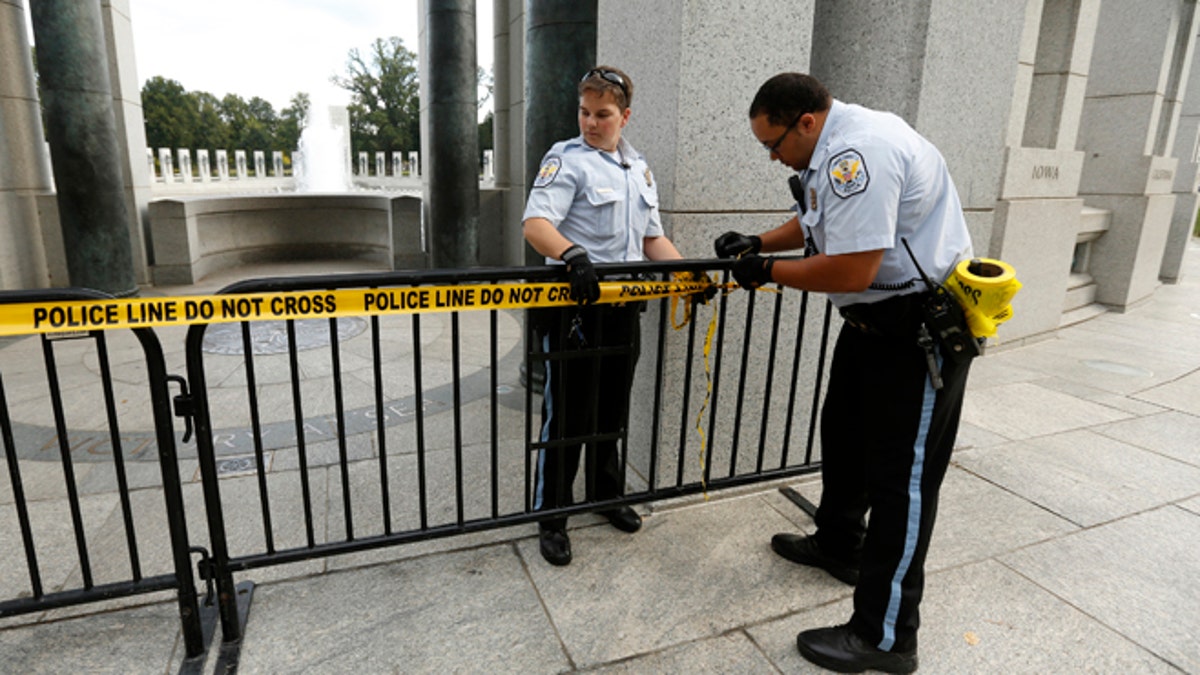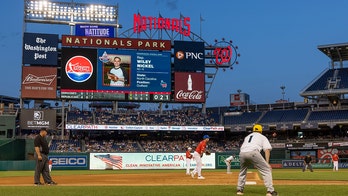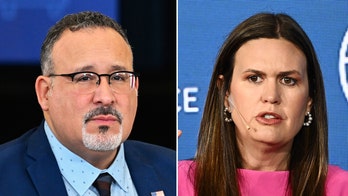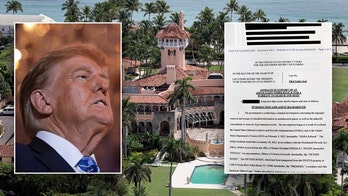
Oct. 1, 2013: U.S. Park Police close off the World War II Memorial. (Reuters)
The media debate has moved from blame for the government shutdown to whether the shutdown itself is such a bad thing.
No government? No problem. About 800,000 federal employees furloughed? Some of them are probably freeloaders who shouldn’t be on the payroll anyway.
That, at least, is what some conservatives are suggesting as the impasse enters its third day, while many liberals are bemoaning the impact of it.
On the left, the Huffington Post blared these headlines at the top of its home page: “Kids With Cancer Blocked From Clinical Trials,” “Food Safety Inspections Suspended,” “Search for Missing Woman Put on Hold,” “NASA Grounded” and “National Parks Closed.”
On the right, Weekly Standard Editor Bill Kristol urges the Republicans to ignore the “media hype.”
“The best thing Speaker Boehner could probably do now is to say it's obvious Senate Democrats aren't going to negotiate, that the House GOP remains ready to talk (and the GOP conferees are in town and ready to confer), but that he's sending the rest of the Republican congressmen home for the next few days in order to talk with their constituents,” he said. “The members would be liberated from the Beltway bubble, free to make their case where they can best make it, able to fight back against media attempts to exaggerate the consequences of the shutdown, and would have a chance to remind voters, in the exchanges' first week of operation, of just how bad in how many ways ObamaCare is…
“So the GOP's agenda for the rest of this week (and maybe until the debt limit deadline of October 17) is pretty simple: Stand pat on the shutdown, don't panic because of media hype or a few snap polls, make their case on the mandate and the special deal for Congress in particular, and on ObamaCare in general—and figure out how to play their hand on the debt limit.”
That’s an interesting phrase, that “media attempts to exaggerate the consequences of the shutdown.” We went through a version of this with the battle over the budget sequester, when the Obama administration used sky-is-falling rhetoric and much of that was trumpeted by the MSM. Some of the dire effects never came to pass.
But shutting down lots of federal agencies is a whole lot more drastic, and whatever your view of the politics, the impact is very real.
I was on “Special Report” last night, and Charles Krauthammer, making the case that the president is enjoying the political benefit of a longer shutdown, said the impact of the government closing was “negligible.” Maybe in macro-economic terms, I said, but not for the millions of people whose paychecks or services are affected, either directly or indirectly.
Still, after a meeting with Hill leaders at the White House that resolved nothing, we are in the surreal position of arguing about the fallout from closing the United States government. During an interview with CNBC, John Harwood asked the president about the markets’ relatively calm reaction to the shutdown.
“I think this time’s different,” Obama said. “I think they should be concerned.”
It almost sounded like the president was trying to talk down the markets or at least ratchet the pressure with the debt-ceiling deadline coming in two weeks.
CNN has a new survey on how this is playing so far.
“According to the poll, 56% of Americans said it would be a bad thing if the debt ceiling was not raised, with 38% saying it would be a good thing for the country,” it says. “By a 51% to 43% margin, the public said it is more important to raise the debt ceiling than to delay ObamaCare. A larger majority, 64% to 27%, in a Quinnipiac University survey released Tuesday said they opposed blocking an increase in the debt ceiling as a way to dismantle the health care law.”
And who is to blame?
“If the debt ceiling is not raised, just over half of those questioned in the CNN poll, 53%, said congressional Republicans would be more responsible rather than Obama, with 31% pointing more fingers at the president,” CNN reports.
What about ObamaCare, the seemingly endless battle that brought us the shutdown? Salon says conservatives should be wary of excessively celebrating the initial problems with the roll out.
“Since glitches could undermine public confidence in ObamaCare and Republicans hate the idea of providing coverage to the uninsured and fear nothing more than the eventual success of the law, this was ‘good news’ on the right.
“Too bad for them the government shutdown they’re responsible for deprived almost all other national news of oxygen. While most government agencies are shuttered for the time being, the Affordable Care Act is humming along on autopilot, its implementation scarcely impacted by the shutdown. Under cover of the media’s obsession with GOP infighting and attendant dysfunction, the administration will have a second chance to make a first impression.
“But that means not taking anything for granted. ACA supporters everywhere, including the president, attributed first day snafus to an unexpected traffic tsunami. It was all good news, they claimed. The demand for ObamaCare is greater than expected.” Still, “eventually — actually, very soon — these websites will need to work reliably for every eligible person who wants to access benefits.”
If not, that will surely help the Republican argument that the law isn’t ready for prime time.
I’ll close with a history lesson from National Review about past shutdowns, given the recent GOP refrain that “even Tip O’Neill” shut down the government in what were supposedly the good old days of bipartisan cooperation. It started in the Carter administration, and then “the shutdowns of the Reagan-O’Neill era … were more budget-focused, and the disputes they involved were over a wider range of policies. They also took less time to resolve. The first such shutdown occurred in November 1981, less than a year into Reagan’s first term. Reagan had demanded at least $4 billion in domestic-spending cuts, and when Congress did not oblige, he vetoed a spending package, triggering a government shutdown. Technically, the shutdown lasted only a few hours, until Congress approved a three-week spending resolution to give lawmakers time to negotiate a long-term deal.
“The government briefly shut down twice the following year, the first time because the House simply failed to pass an agreed-on spending bill before funding expired. According to the New York Times, party leaders missed the deadline in order to attend 'major social events,' which included a barbecue at the White House and a high-dollar Democratic fundraiser. Reagan ultimately accepted a funding agreement even though it called for higher levels of spending than he would have liked.
“Months later, the government shut down for several days in part over the House’s refusal to fund an intercontinental-missile program that Reagan supported. The House also wanted more than $5 billion in funding for public-works projects, which Reagan had threatened to veto. In the end, the public-works funding was scrapped, but so was funding for the missile program.
“Another shutdown occurred in November 1983 after House Democrats requested an additional $1 billion in funding for education and reduced spending on defense and foreign aid.”
What is striking is how most of this involved pretty small potatoes. That’s not the case this time, and the high stakes are the reason the standoff may not be settled any time soon.




